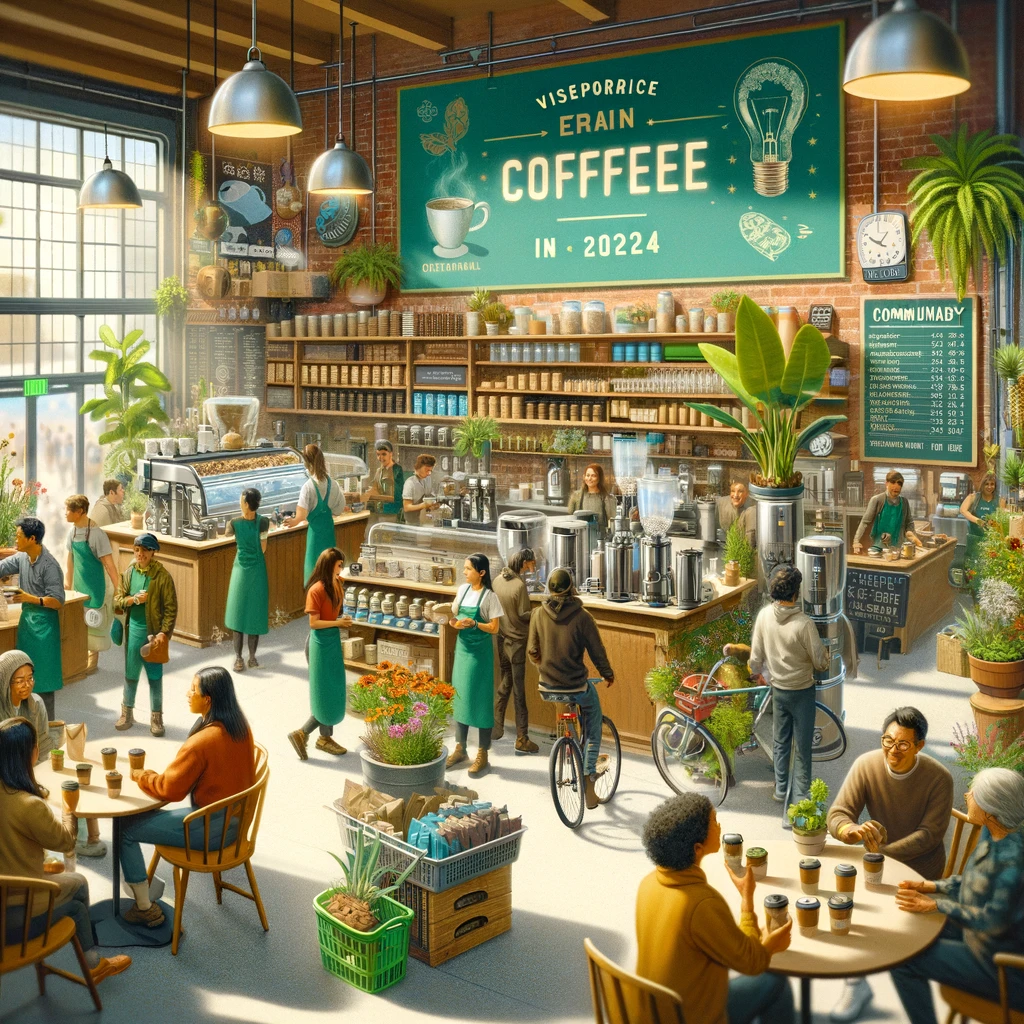The world of coffee is ever-evolving, with 2024 marking a significant year in the exploration and enjoyment of coffee flavors globally. As we delve into the intricate landscape of coffee preferences, it becomes clear that the global palate is expanding, seeking out new, innovative, and traditional flavors alike.
This article, structured in the spirit of comprehensive analysis, aims to shed light on the current state and future directions of coffee flavors worldwide, drawing from a variety of authoritative sources to present a detailed overview.
Introduction to Coffee Flavor Trends in 2024
Coffee, a beverage revered across continents for its rich taste and energizing effect, continues to undergo a transformation in terms of consumer preferences and market trends. In 2024, the coffee industry witnesses a remarkable shift towards more diverse and sophisticated flavor profiles, driven by a combination of technological advancements, cultural exchange, and a growing emphasis on sustainability and ethical sourcing.
From the malted marvels to the artisanal allure, the global coffee scene is vibrant with innovation and tradition.
The Rise of Malted and Artisanal Flavors
One of the standout trends of 2024 is the emergence of malted coffee flavors. As noted by Food and Drink Resources, malted coffee offers a unique taste that blends the traditional with the innovative, promising to captivate the palates of coffee enthusiasts around the world. This trend underscores a broader movement towards embracing complex, nuanced flavors that offer a departure from the conventional.
Artisanal coffee, too, has seen a significant rise, with local roasters and cafes crafting bespoke blends that highlight the unique characteristics of beans from specific regions. According to Coffee Affection, the focus on specialty drinks and artisan coffee underscores a growing appreciation for the craftsmanship involved in coffee production, from bean to cup.

Photo Credit
Global Preferences and Consumption Patterns
The global coffee market in 2024 is characterized by its diversity in consumption patterns and preferences. A survey conducted by Drive Research reveals that nearly 73% of Americans drink coffee every day, with 36% consuming 3 to 5 cups daily. This statistic not only highlights the central role of coffee in daily life but also points to the significant demand for quality and variety in coffee offerings.
Moreover, the shift in U.S. coffee trends, as reported by Coffee Craftery, indicates a declining popularity of black coffee, with preferences diversifying into flavored and specialty coffees. This trend is reflective of a broader global movement towards more personalized and flavor-focused coffee experiences.
Detailed Analysis of Coffee Flavor Trends
Malted Coffee: A New Frontier
- Popularity Surge: Malted coffee flavors are gaining traction, with an increasing number of coffee shops incorporating malted options into their menus.
- Consumer Reception: Initial feedback suggests a positive reception, with consumers appreciating the unique blend of sweetness and depth that malted flavors offer.
Artisanal and Specialty Coffees
- Local Roasters Leading the Way: The rise of local roasters has been instrumental in popularizing artisanal coffee, with a focus on sustainability and ethical sourcing.
- Innovation in Flavors: Specialty coffees are experimenting with a range of flavors, from fruity to floral, offering consumers a broad spectrum of taste experiences.
Consumption Patterns and Preferences
- Daily Consumption: A significant portion of the population, particularly in the U.S., consumes coffee daily, indicating a robust market for coffee products.
- Preference Shifts: There is a noticeable shift towards flavored and specialty coffees, moving away from traditional black coffee.
In conclusion, the first part of our exploration into global coffee flavors in 2024 reveals a dynamic and diverse landscape, marked by innovation, tradition, and a deep appreciation for the art of coffee making. As we continue to delve deeper into this topic in subsequent sections, the evolving preferences and trends in the coffee industry promise to offer fascinating insights into the global coffee culture.
Exploring Regional Coffee Flavors and Innovations in 2024
The global coffee industry's landscape in 2024 is not just about the rise of malted and artisanal flavors but also about the regional innovations and preferences that contribute to the rich tapestry of global coffee culture. This section delves into the distinctive coffee flavors and trends emerging from various corners of the world, highlighting how local traditions and modern innovations intersect to shape the future of coffee.
The Influence of Geography on Coffee Flavors
Coffee's flavor is profoundly influenced by the geographical conditions in which its beans are grown. Altitude, climate, and soil composition all play critical roles in determining the beans' inherent flavor profiles. In 2024, consumers are increasingly interested in single-origin coffees and those that highlight the unique characteristics imparted by their regions of origin.
Africa: The Birthplace of Coffee
- Ethiopian Coffee: Known for its floral and fruity notes, Ethiopian coffee continues to be highly sought after. In 2024, there's a growing trend towards lighter roasts that better preserve these delicate flavors.
- Kenyan Coffee: Kenyan coffee is prized for its bright acidity and berry-like flavors. The industry sees a surge in demand for Kenyan beans, with consumers appreciating the vibrant and bold taste profiles.
Latin America: Diversity in Every Cup
- Colombian Coffee: Colombian coffee remains a staple, famous for its balanced flavor and medium body. In 2024, there's an increased interest in regional varieties from Colombia, each offering distinct taste notes.
- Brazilian Coffee: As the world's largest coffee producer, Brazil's coffee is known for its chocolatey, nutty flavors. This year, Brazilian coffee sees innovation in processing methods, enhancing its natural flavors.
The Rise of Specialty Coffee Techniques
The way coffee is processed, roasted, and brewed has a significant impact on its final flavor. In 2024, the coffee industry witnesses an evolution in these techniques, with a focus on enhancing the sensory experience of coffee.
Processing Innovations
- Natural and Honey Processing: These methods, which involve drying coffee cherries with the bean still inside, are gaining popularity for their ability to impart sweet, complex flavors to the coffee.
- Experimental Fermentation: Fermentation techniques are being explored for their potential to introduce unique flavors into coffee, ranging from fruity to wine-like.
Roasting and Brewing Trends
- Light Roasting: Light roasts are increasingly favored for their ability to highlight the bean's original flavor profile, especially for single-origin coffees.
- Cold Brew and Nitro Coffee: Cold brew continues to grow in popularity, appreciated for its smooth, mellow flavor. Nitro coffee, infused with nitrogen, offers a creamy texture without added dairy.
Consumer Preferences and Market Trends
The global coffee market in 2024 is shaped by evolving consumer preferences, with a clear trend towards more personalized and sustainable coffee experiences.
Demand for Personalization
- Customizable Coffee Blends: Consumers are looking for ways to customize their coffee, from selecting specific beans to adjusting grind size and brewing methods.
- Subscription Services: Coffee subscription services are on the rise, offering personalized selections of coffee delivered directly to consumers' homes.
Sustainability and Ethical Sourcing
- Fair Trade and Direct Trade: There's a growing demand for coffees that are ethically sourced, with fair trade and direct trade practices becoming increasingly important to consumers.
- Eco-Friendly Packaging: Sustainability concerns are driving the adoption of eco-friendly packaging solutions for coffee products, from biodegradable pods to compostable bags.
The Role of Technology in Coffee Consumption
Technology plays a pivotal role in shaping the coffee industry in 2024, from production to consumption.
Innovations in Coffee Machines
- Smart Coffee Makers: Smart technology is integrated into coffee machines, allowing users to customize their brewing experience via smartphone apps.
- Precision Brewing Equipment: Equipment that offers precise control over brewing variables, such as temperature and extraction time, is becoming more accessible to home consumers.
Online Coffee Communities
- Virtual Tastings and Workshops: Online platforms host virtual coffee tastings and brewing workshops, connecting coffee enthusiasts worldwide and fostering a global coffee community.
- Social Media Influence: Social media continues to influence coffee trends, with platforms like Instagram and TikTok showcasing innovative coffee recipes and brewing techniques.
In this exploration of regional coffee flavors and innovations in 2024, it's evident that the global coffee industry is a vibrant and dynamic field, marked by a deep respect for tradition coupled with an eagerness to innovate. As we continue to navigate the world of coffee, the regional nuances and technological advancements promise to keep the journey exciting and flavorful.
Future Directions: Sustainability and Innovation in Coffee Flavors
As we venture further into the exploration of global coffee flavors in 2024, it becomes clear that the future of coffee is not just about taste but also about sustainability and innovation. This final section examines the emerging trends that are set to define the coffee industry in the years to come, focusing on sustainable practices, technological advancements, and the continuous quest for unique flavors.
Embracing Sustainability in Coffee Production
The coffee industry faces significant challenges related to climate change, deforestation, and the need for sustainable farming practices. In response, 2024 sees a concerted effort towards more sustainable coffee production methods.
Regenerative Agriculture
- Soil Health and Carbon Sequestration: Coffee farmers are adopting regenerative agriculture practices that improve soil health, enhance biodiversity, and sequester carbon, contributing to the fight against climate change.
Water Conservation Techniques
- Reduced Water Use in Processing: Innovations in coffee processing technologies are focusing on reducing water usage, with methods like dry (natural) processing becoming more prevalent.
Technological Innovations Shaping Coffee's Future
Technology continues to play a crucial role in the evolution of the coffee industry, from farm to cup.
Blockchain for Traceability
- Enhanced Transparency: Blockchain technology is being used to improve the traceability of coffee, allowing consumers to verify the origin and ethical credentials of their coffee beans.
Artificial Intelligence in Flavor Development
- AI-Powered Flavor Profiling: Artificial intelligence is aiding in the development of new coffee flavors, analyzing consumer preferences and predicting successful flavor combinations.
The Quest for New Coffee Experiences
As consumers become more adventurous in their coffee consumption, the industry is responding with innovative flavors and experiences.
Exotic and Rare Coffee Varieties
- Discovery of New Varieties: The search for unique coffee experiences is leading to the discovery and cultivation of rare coffee varieties, offering distinct and novel flavor profiles.
Coffee as an Artistic Medium
- Coffee and Culture: Coffee is increasingly being seen as an artistic medium, with coffee shops and roasters collaborating with artists and cultural institutions to create immersive coffee experiences.
Conclusion
The global coffee industry in 2024 stands at the intersection of tradition and innovation, with a clear path towards sustainability and ethical practices. As we've explored the trends, preferences, and innovations shaping coffee flavors globally, it's evident that the future of coffee is vibrant and diverse.
The industry's commitment to sustainability, coupled with technological advancements and a continuous quest for unique flavors, ensures that coffee will remain an integral part of our daily lives, offering new experiences and challenges.
As consumers, our appreciation and demand for sustainable, ethically sourced, and innovative coffee products will drive the industry forward, ensuring a rich and flavorful future for coffee enthusiasts around the world.
Frequently Asked Questions
-
What are the most popular coffee flavors in 2024?
- Malted, artisanal, and exotic fruit flavors are among the most popular in 2024, reflecting a trend towards complex and nuanced taste profiles.
-
How is sustainability being addressed in the coffee industry?
- Through regenerative agriculture, water conservation in processing, and the adoption of eco-friendly packaging, the industry is making strides towards sustainability.
-
What role does technology play in coffee production?
- Technology, including blockchain for traceability and AI for flavor development, is crucial for enhancing sustainability, quality, and consumer experience.
-
Are there any new coffee brewing techniques in 2024?
- Precision brewing equipment and innovative methods like cold brew and nitro coffee are gaining popularity for their unique flavor profiles.
-
How can consumers contribute to sustainable coffee consumption?
- By choosing ethically sourced, fair trade, and direct trade coffee, and supporting brands that prioritize sustainability.
-
What is regenerative agriculture in the context of coffee farming?
- It's a set of farming practices aimed at improving soil health, enhancing biodiversity, and sequestering carbon.
-
Can technology improve coffee flavor?
- Yes, AI is being used to analyze consumer preferences and develop new, successful coffee flavors.
-
What is the significance of blockchain in coffee?
- Blockchain enhances the transparency and traceability of coffee, allowing consumers to verify its origin and ethical credentials.
-
Are rare coffee varieties becoming more accessible?
- Yes, the quest for unique flavors is leading to the discovery and cultivation of rare varieties, making them more accessible to consumers.
-
How is coffee becoming an artistic medium?
- Coffee shops and roasters are collaborating with artists to create immersive experiences, elevating coffee to an artistic medium.












